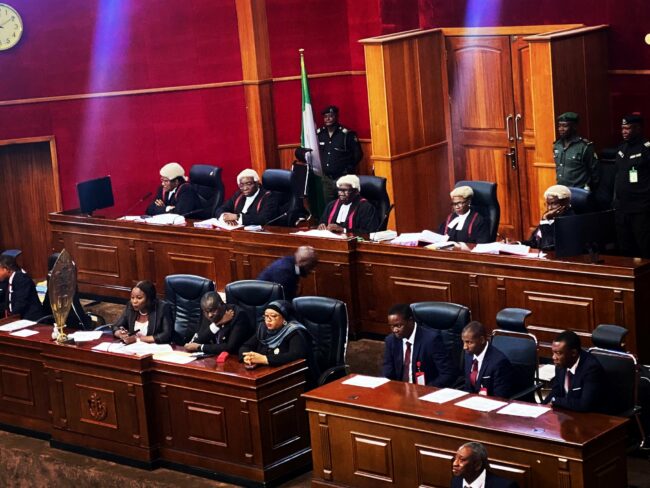The President of the Court of Appeal, Justice Monica Dongban-Mensem, said on Monday that 99 panels were set up to sit on election petitions in 2023.
Dongban-Mensem made this known on Monday in Abuja at the opening of a two-day workshop to review the 2023 Election Petition Tribunals, Courts, and Appeals.
The News Agency of Nigeria (NAN) reports that the workshop was organised in partnership with the International Foundation for the Electoral System (IFES) and the Policy and Legal Advocacy Centre (PLAC).
Others are the United States Agency for International Development (USAID), the UK International Development Agency, and the European Union.
The workshop, she said, was organised to ensure that the country‘s electoral process excels and also to learn from errors made and ways to proceed in the process better.
”The need to review the judicial process that preceded the election in 2023 was very important. It was a very difficult task and very challenging at the same time.
”A total of 99 panels were set up, with three judges sitting in each of them, drawn from high courts.
”That was a huge number of judges taken out of our judicial system and dedicated to the electoral process.
”This workshop is important because we are dedicated and committed to ensuring that our electoral process excels.
”We want to learn from our errors; we want to discuss what we found wrong with our legislation during this election after trying and applying the provisions.
”We are now in the position to say whether or not those provisions can actually move our electoral process forward,” she said.
She expressed appreciation to the justices of the court of appeals, judges of the high courts, and customary courts; she also thanked development partners for their commitment.
Similarly, the Attorney General of the Federation and minister of justice, Lateef Fagbemi, SAN, in his remarks, commended the judiciary for the stabilising role it plays in the electoral process as a nation.
He noted that the Court of Appeal, in particular, plays a more pivotal role in shaping and strengthening electoral jurisprudence through the exercise of its constitutional mandate in that regard.
”I will like to note that the vision of this workshop, which is targeted at promoting judicial excellence, electoral integrity, and democratic governance, accords with the vision of the current administration in the areas of advancing judicial reforms and good governance.
”I am confident that the array of diverse and esteemed judicial icons, legal minds, electoral experts, and other stakeholders will no doubt satisfactorily dissect the issues arising from the theme of this workshop.
”I, therefore, look forward to the resolutions of this workshop to provide further guidance for me in my commitment to enhancing the quality of the administration of justice and adherence to democratic principles in our country.
”Once again, I extend my heartfelt appreciation to the President of the Court of Appeal, IFES, and PLAC for their vision, leadership, and dedication to promoting judicial excellence and electoral integrity.
”I also commend all our noble lordships who served either as chairman or members of the various election petition tribunals and courts for their hard work and commitment to the course of justice and national development,” he said.
Speaking, the Chief Justice of Nigeria (CJN), Justice Olukayode Ariwoola, noted that political matters always tend to occupy the front burners of adjudicatory activities.
He added that all existing electoral laws have some time frame within which they must be heard and decided.
”So many things have been thrown up in the course of the various adjudications that took place at the different tribunals and courts that we now have to serve on our workshop table for intense rumination and digestion, as it were.
”This workshop is no doubt coming at the most auspicious time. It will undoubtedly offer us the rare opportunity to review those things that we may have done at our various levels that may not have been done with the best of intentions and professionalism.
”Like they always say, it is better late than never. Every given opportunity in life offers us a free ticket to do something novel and more impactful, especially misapplication of discretion.
Speaking, Mr Clement Nwankwo, executive director of the Policy and Legal Advocacy Centre, said the outcome of the judgements as preserved by the citizens matters.
He noted that when the election umpire fails, the judiciary should stand to correct.
”The review of the past election is very important; the review is meant to make us know how to move forward next time.
”As judges, I know you are guided by the law; perception and interpretation make the judiciary more prominent.
”You should be able to look at what was done, the judgements given, and the decisions taken to ensure that it will be able to be seen as justice,” he said.
ALSO READ THESE TOP STORIES FROM NIGERIAN TRIBUNE
